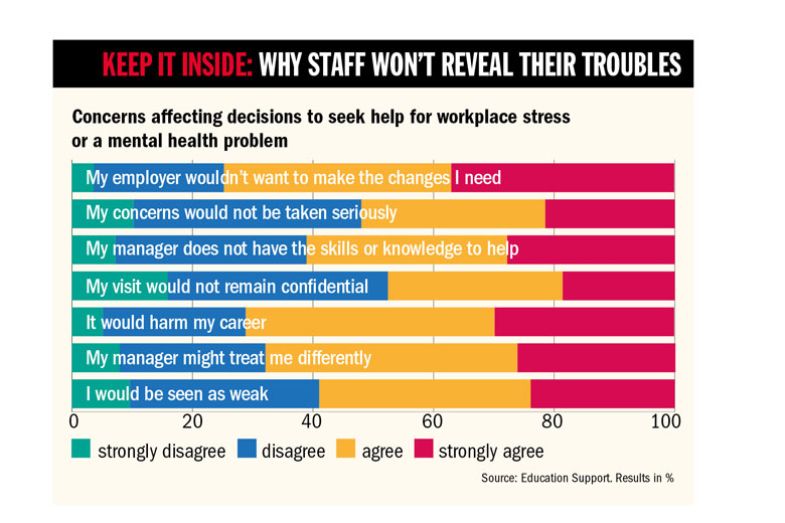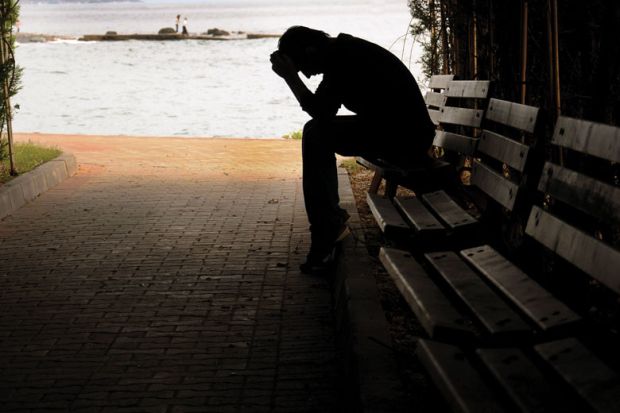Seven in 10 UK university staff would be reluctant to seek support for mental health problems for fear that it would harm their career, according to a major study that found that the majority of respondents were probably suffering from depression.
The survey of 2,046 academic and academic-related staff, conducted for the Education Support charity and published on 28 October, reveals deep concerns about well-being, workload and burnout in higher education – as well as the support provided by employers.
Asked about worries that might deter them from seeking help at work for stress or a mental health problem, 71 per cent of respondents said that they feared that it would harm their career.

Fifty-nine per cent said they would be seen as weak if they sought support, while 52 per cent felt that their concerns would not be taken seriously, and 61 per cent said their manager did not have the skills or knowledge to help.
“If you voice a problem, you will come off worse. People who complain or ask questions are unpopular here, so we just get on with it,” one survey respondent said.
The results are particularly worrying in light of data in the survey suggesting that the well-being of university staff was “considerably lower” than population norms. Answering a series of questions about their psychological health, only 29 per cent gave scores indicating average well-being or better, and 53 per cent gave scores indicating probable depression.
Overall, 71 per cent of respondents said psychological health was not a priority for their university, and 78 per cent disagreed that senior managers considered staff well-being to be as important as productivity.
Among other findings:
- Seventy-nine per cent of respondents reported having to work very intensively often or always, with 52 per cent experiencing unrealistic time pressures often or always
- Fifty-six per cent said they had to perform unnecessary tasks at work often or frequently
- Sixty-five per cent reported feeling emotionally drained from work at least once a week – 26 per cent felt this way a few times a week, and 29 per cent reported feeling this way every day
- Sixty-two per cent reported regularly working more than 40 hours a week, with 22 per cent working at least 50 hours; one in five respondents on academic contracts worked the equivalent of two additional working days each week
- There was a significant knock-on effect on respondents’ personal lives, with 69 per cent reporting that they often or always came home too tired to do the things they would like to do.
The research was conducted by Siobhan Wray, associate professor of organisational behaviour at the University of Lincoln, and Gail Kinman, visiting professor of occupational health psychology at Birkbeck, University of London.
In general, respondents in academic roles reported working longer hours and were at greater risk of mental health problems, burnout and poor work-life balance than colleagues in professional roles, the survey found.
Respondents reported that working from home during Covid-19 had been beneficial for productivity and well-being, but there were widespread concerns that the demands of teaching and supporting students during the pandemic had increased workloads even further.
And respondents repeatedly highlighted that management efforts to improve staff well-being would achieve little if the central issue of workload was not addressed.
“Individual interventions such as mindfulness and relaxation will not help when we are working 100 hours a week and still can’t meet our deadlines,” one respondent said.
“The provision of support…is of limited use when there is a climate of work that valorises long hours, weekend working, not taking holidays and coming to work whilst sick. This is a culture endemic in higher education and is worn as a badge of honour by senior staff and those wishing to gain promotion,” another said.
The report calls on universities to establish a “systemic and sustainable” approach to well-being by reducing demands on staff, increasing the support that is available, and promoting a culture where help-seeking is not stigmatised but rather encouraged.
Professor Kinman said that a series of reports had made clear “what the problems are” in the sector and that it “really is time for some action”.
Many universities seemed reluctant “to accept that happy and healthy staff equates to happy, healthy and motivated students”, she told Times Higher Education.
“The pandemic has been tough, but it has started a lot of conversations about mental well-being…this is an ideal time to tear up the book and find what actually works.”
POSTSCRIPT:
Print headline: The burned-out suffer in silence
Register to continue
Why register?
- Registration is free and only takes a moment
- Once registered, you can read 3 articles a month
- Sign up for our newsletter
Subscribe
Or subscribe for unlimited access to:
- Unlimited access to news, views, insights & reviews
- Digital editions
- Digital access to THE’s university and college rankings analysis
Already registered or a current subscriber? Login








